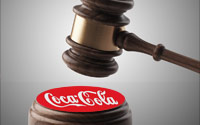
Consumers can proceed with a lawsuit against Coca-Cola for allegedly sending them unwanted SMS messages, a federal judge has ruled.
In a decision issued this week, U.S. District Court Judge Irma Gonzalez in the Southern District of California rejected Coca-Cola's argument that the consumer's allegations were too vague to
warrant further proceedings. “Plaintiffs allege sufficient factual content to support each element of the ... claims alleged,” Gonzalez wrote.
The lawsuit dates to January, when
California resident Bryan Robbins and Maryland resident Marvin Feiges alleged that the soft-drink company violated the federal Telephone Consumer Protection Act by sending them unwanted SMS ads for
Coke Zero and other products. That law prohibits companies from using automated dialing services to send SMS messages without the recipients' consent; it provides for damages of $500-$1,500 per
incident.
advertisement
advertisement
Coca-Cola and its agents allegedly “directed the mass transmission of text messages to the cell phones nationwide of what they hoped were customers or potential
customers,” Robbins and Feiges allege in the lawsuit. Robbins added that he continued to receive messages even after replying “stop” to one of the texts.
The beverage company
argued that the complaint should be dismissed for vagueness. The company said that Robbins and Feiges didn't allege the exact dates they received the messages, the number of messages or their specific
contents.
But Gonzalez disagreed with the company, noting that additional details about the allegations will emerge when Coca-Cola and the consumers exchange evidence before trial.
Coca-Cola faced a similar lawsuit last year, but that case went to arbitration before there was a decision about whether the company violated the law.
Coca-Cola is one of several marketers
sued in recent years for allegedly violating the Telephone Consumer Protection Act. The influential 9th Circuit Court of Appeals paved the way for such lawsuits in 2009, when it ruled that book publisher Simon & Schuster might have violated the law by allegedly sending
unsolicited text messages promoting Stephen King's "Cell."